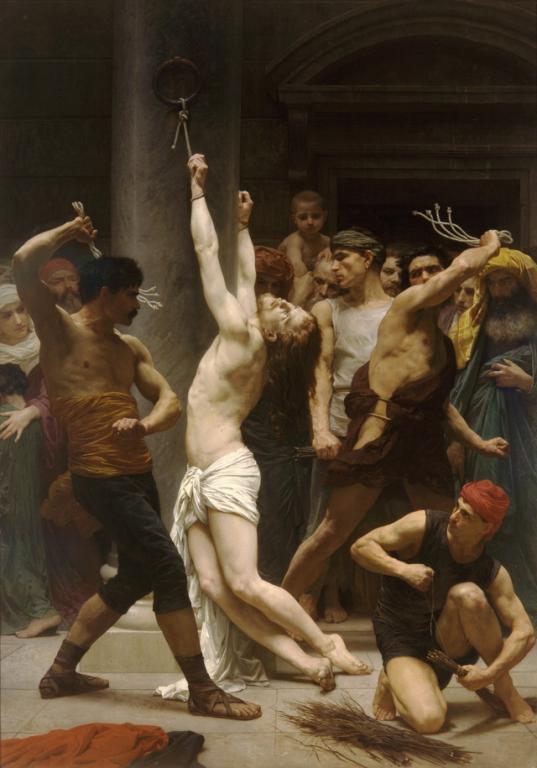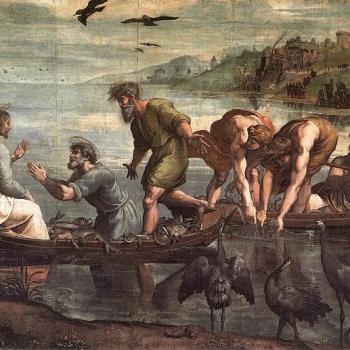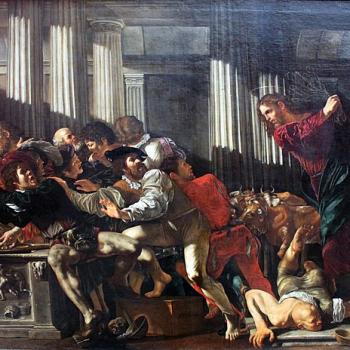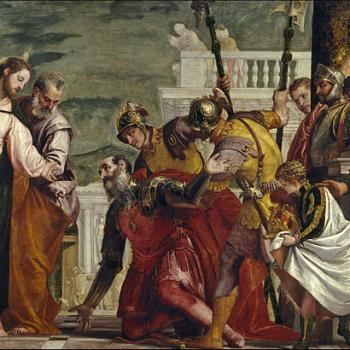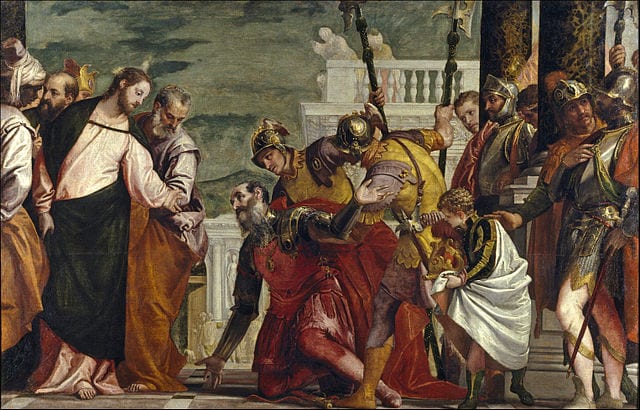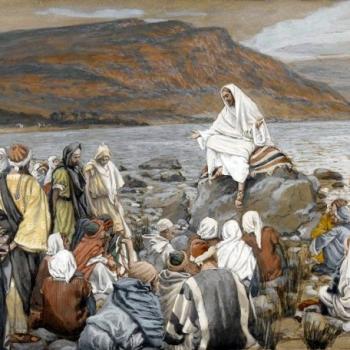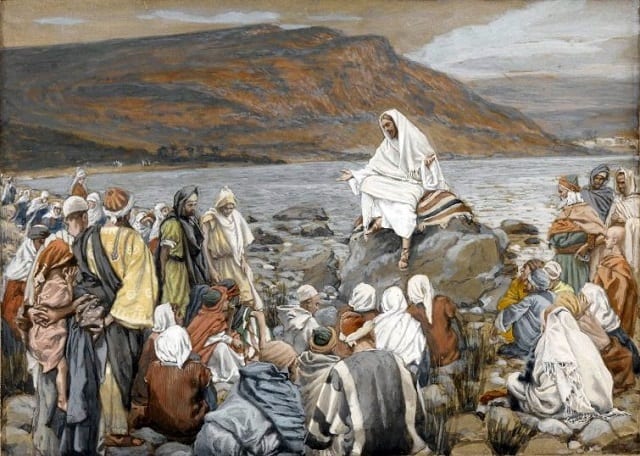Why Did Mark Omit Jesus’ Baptism? / Why Was Jesus Baptized? / “Suffering Servant” & Messiah in Isaiah / Spiritual “Kingdom of God” / Archaeological Support

This is an installment of my replies to a series of articles on Mark by Dr. David Madison: an atheist who was a Methodist minister for nine years: with a Ph.D. in Biblical Studies from Boston University. His summary article is called, “Not-Your-Pastor’s Tour of Mark’s Gospel: The falsification of Christianity made easy” (Debunking Christianity, 7-17-19). His words will be in blue below.
Dr. Madison has utterly ignored my twelve refutations of his “dirty dozen” podcasts against Jesus, and I fully expect that stony silence to continue. If he wants to be repeatedly critiqued and make no response, that’s his choice (which would challenge Bob Seidensticker as the most intellectually cowardly atheist I know). I will continue on, whatever he decides to do (no skin off my back).
Dr. Madison believes we are not at all sure whether Jesus in fact said anything recorded in the Gospels. The atheist always has a convenient “out” (when refuted in argument about some biblical text) that Jesus never said it anyway and that the text in question was simply made up and added later by unscrupulous and “cultish” Christian propagandists.
I always refuse to play this silly and ultimately intellectually dishonest game, because there is no way to “win” with such a stacked, subjective deck. I start with the assumption (based on many historical evidences) that the manuscripts we have are quite sufficient for us to know what is in the Bible (believe it or not).
Dr. Madison himself — in his anti-Jesus project noted above, granted my outlook, strictly in terms of practical “x vs. y” debate purposes: “For the sake of argument, I’m willing to say, okay, Jesus was real and, yes, we have gospels that tell the story.” And in the combox: “So, we can go along with their insistence that he did exist. We’ll play on their field, i.e., the gospels.” Excellent! Otherwise, there would be no possible discussion at all.
*****
Dr. Madison called this installment: Did Jesus Graduate from Hogwarts?: The problems pile on, right from the start (2-16-18).
Problem Number 1: A Big Omission
It has been a source of some anxiety among theologians that Mark begins his story with Jesus as an adult: There is no mention whatever of a virgin birth. Why would Mark leave that out? For starters, of course, he may never have heard this story associated with Jesus. The apostle Paul, who had written a couple of decades earlier, hadn’t heard of it either—at least, he never mentions it.
Apologist J. Warner Wallace deals with this:
While it is true that Mark does not include a birth narrative, this does not mean that he was either unaware of the truth about Jesus or denied the virgin conception. Eyewitnesses often omit important details because they either (1) have other concerns they want to highlight with greater priority, or (2) presume that the issue under question is already well understood. The gospel of Mark exhibits great influence from the Apostle Peter. In fact, the outline of Mark’s Gospel is very similar to the outline of Peter’s first sermon at Pentecost. According to the Papias, Mark was Peter’s scribe; his gospel is brief and focused. Like Peter’s sermon in Chapter 2 of the Book of Act’s, Mark is focused only on the public life, ministry, death and resurrection of Jesus. But Mark is not alone in omitting the birth narrative. John’s gospel is considered by scholars to be the last Gospel written. The prior three “synoptic Gospels” were already in circulation and the issue of the virgin conception had already been described in two of them. Yet John also omitted the birth narrative. Why? John clearly wanted to cover material that the other Gospel writers did not address; over 90% of the material in the Gospel of John is unique to the text. If John did not agree with the virgin conception as described in the Gospels of Matthew or Luke, he certainly had the opportunity to correct the matter in his own work. But John never does this; his silence serves as a presumption that the “virgin conception” has been accurately described by prior authors. . . .
At the same time, Mark does not appear to be ignorant of the “virgin conception”. Note, for example, that Mark uses an unusual expression related to Jesus’ parentage:
Mark 6:1-3 Jesus went out from there and came into His hometown ; and His disciples followed Him. When the Sabbath came, He began to teach in the synagogue ; and the many listeners were astonished, saying, “Where did this man get these things, and what is this wisdom given to Him, and such miracles as these performed by His hands ? “Is not this the carpenter, the son of Mary, and brother of James and Joses and Judas and Simon ? Are not His sisters here with us?” And they took offense at Him.
It is highly unusual for the “many listeners” in this first century Jewish culture to describe Jesus as the “son of Mary” rather than the “son of Joseph”. These first century eyewitnesses of Jesus apparently knew something about Jesus’ birth narrative and chose to trace Jesus’ lineage back through His mother rather than through His father (as would customarily have been the case). This early reference in the Gospel of Mark may expose the fact that Mark was aware of the “virgin conception” . . . (“Why Doesn’t Mark Say Anything About Jesus’ Birth?”, Cold-Case Christianity, 12-11-15)
Problem Number 2: Baptism for the Forgiveness of Sins
We read in vv. 4-5: “John the baptizer appeared in the wilderness, proclaiming a baptism of repentance for the forgiveness of sins. And people from the whole Judean countryside and all the people of Jerusalem were going out to him, and were baptized by him in the river Jordan, confessing their sins.”
Just what Jesus should do, right? Well, no. Why would the perfect, sinless son of God show up to be baptized? Mark’s naiveté has bothered theologians—starting with Matthew, who maneuvered to avoid this embarrassment. He adds extra script, i.e., that John the Baptist objected (3:14): “John would have prevented him, saying, ‘I need to be baptized by you, and do you come to me?” Jesus seems to say, “True, but let’s do it for appearances.” “But Jesus answered him, ‘Let it be so now; for it is proper for us in this way to fulfill all righteousness’” (v. 3:15). In John’s gospel Jesus doesn’t even set foot in the water. John says that he saw the spirit descend on Jesus “as a dove from heaven,” and declares, “Here is the lamb of God who takes away the sin of the world.”
Catholic writer Kirsten Andersen explains:
Since Jesus didn’t have any sins that needed forgiving (original or otherwise), was already fully himself and fully God’s son and had no need of salvation, baptism would seem redundant . . .
So what’s the deal? Why did Jesus insist on receiving baptism from John, even though John himself flat-out objected, arguing that it was Jesus who should baptize him?
The easy answer is that Jesus was simply setting the example for his followers. “WWJD” bracelets may be out-of-fashion and clichéd, but they do express the rather profound truth that as long as we keep our eyes on Jesus, and do what he showed us how to do in both word and deed, salvation can be ours. . . .
[T]he baptism Jesus received from John wasn’t the same sacrament we celebrate today. How could it have been? Jesus had not yet established his Church, so the sacraments didn’t exist yet. The “baptisms” John performed were actually ritual washings (mikveh/pl. mikvaot) given to converting and reverting Jews, symbolizing the death of one’s old, sinful self, and rebirth as a ritually clean Jew.
Mikvaot were commonly performed to cleanse Jews of any sins and ritual impurities before presenting themselves at the temple, . . . (“If Jesus Was Sinless, Why Did He Need to Be Baptized?,” Aleteia, 1-8-16)
Catholic writer Cale Clark cites Pope Benedict XVI (writing before he was pope), explaining another symbolic aspect of Jesus’ baptism:
Pope Benedict XVI (writing as Joseph Ratzinger), in his Jesus of Nazareth [2004] offers some illuminating insights on all this. There’s a whole chapter in the book on Jesus’ baptism, but here are a few of his key thoughts.
First, in antiquity water conjured up two distinct images: death and life. Benedict notes:
On the one hand, immersion into the waters is a symbol of death, which recalls the death symbolism of the annihilating, destructive power of the ocean flood. The ancient mind perceived the ocean as a permanent threat to the cosmos, to the earth; it was the primeval flood that might submerge all life . . . But the flowing waters of the river are above all a symbol of life (15-16).
Even the physical act of baptism, especially baptism by immersion, represents death and new life: the descent into the waters is a form of death and burial; the rising to a new life is an icon of resurrection.
Looking at the events (of Christ’s baptism) in light of the Cross and Resurrection, the Christian people realized what happened: Jesus loaded the burden of all mankind’s guilt upon his shoulders; he bore it down into the depths of the Jordan. He inaugurated his public activity by stepping into the place of sinners. His inaugural gesture is an anticipation of the Cross. He is, as it were, the true Jonah who said to the crew of the ship, ”Take me and throw me into the sea” (Jon. 1:12) . . . The baptism is an acceptance of death for the sins of humanity, and the voice that calls out “This is my beloved Son” over the baptismal waters is an anticipatory reference to the Resurrection. This also explains why, in his own discourses, Jesus uses the word “baptism” to refer to his death (18).
The Eastern traditions of iconography pick up on many of these themes, as the current pope emeritus elucidates:
The icon of Jesus’ baptism depicts the water as a liquid tomb having the form of a dark cavern, which is in turn the iconographic sign of Hades, the underworld, or hell. Jesus’ descent into this watery tomb, into this inferno that envelops him from every side, is thus an anticipation of his act of descending into the underworld . . . John Chrysostom writes: “Going down into the water and emerging again are the image of the descent into hell and the Resurrection” (19). (“Why Jesus Was Baptized,” Catholic Answers, 1-9-18)
Problem Number 3: The Powerful Savior Myth
John the Baptist appeared in the wilderness to “prepare the way of the Lord”—“the one who is more powerful than I is coming after me” (v.7). These texts—and many others like them—usher us into the world of delusional thinking that seeks to bend history to fit theology. The Chosen People had been oppressed for centuries—which was inexplicable. What was the way out of this? It’ll be magic: There is a hero on the way, a messiah, one specially anointed by God, who will set things right. Thus one of the main themes of Mark is the proclamation of Jesus that the “the time is fulfilled, and the kingdom of God has come near” (v. 15).
But that didn’t happen. God has not intervened in human history to make everything better. When hope faded that the Son of Man would descend to Earth to establish the kingdom of God, Christian theologians made the adjustment: it became a “spiritual” reality. But we’re still dealing with a form of hero worship: “Here is the lamb of God who takes away the sin of the world.”
What? Someone can actually do that? Whether it’s intervening in history to rescue the Chosen People, or “taking away the sins of the world,” it’s wishful thinking, theology denying reality. This is the Superman fantasy, and outside of the ‘messiah’ version of it, nobody takes it seriously. Of course, in our own time, there have been so many spin-off super-heroes; this is fun fantasy, nothing more.
The Jews for centuries had had a dual notion of the Messiah: that of the Suffering Servant and of the conquering king. So this was nothing new. Educated Christians knew the Old Testament. It included Isaiah 53, which is the famous passage of the Messiah suffering. There was no huge [implied, dishonest] “adjustment” made by the time the Gospels were written. Whereas during the time of Jesus it was understandable that some thought that the messianic kingdom was to be established, and the end of the age was near, after He died, of course it was understood that He was the suffering servant, and that the “triumphant” messianism had to await His second Coming. In the meantime, Jesus made salvation possible by His redemptive death; and that is quite enough itself.
Dr. Madison acts as if John the Baptist was proclaiming a superhero and the messianic earthy kingdom: fulfilled in Jesus. If so, how odd that he referred to Him as follows: “”Behold, the Lamb of God, who takes away the sin of the world!” (Jn 1:29, RSV). That’s the suffering Messiah of Isaiah 53. The Jews at the time couldn’t misinterpret the analogy of the Passover Lamb that was sacrificed. Jesus’ sacrifice on the cross was also at the time of Passover.
Mark cites Isaiah 40:3: “A voice cries: ‘In the wilderness prepare the way of the LORD, make straight in the desert a highway for our God.'” Isaiah 40:1-26 is a triumphant passage of hope. God was going to deliver the Israelites. But as always in the Old Testament, such deliverance was conditional upon obedience. And once again, as so often, God didn’t receive that, as the grand narrative of the magnificent book of Isaiah continues. Thus, we see the beginning of this discontent in the same chapter:
Isaiah 40:27 Why do you say, O Jacob, and speak, O Israel, “My way is hid from the LORD, and my right is disregarded by my God”? (cf. 49:14: “. . . “The LORD has forsaken me, my Lord has forgotten me.”)
God in effect responds to this rebellion and rejection in Isaiah chapters 41-47. Isaiah 42 describes what could have been, had Israel been obedient. But it was not, and Israel’s exile came about as a result (43:22-28). Then Babylon is judged for opposing Israel (chapters 46-47). Isaiah 48 is God’s response to Israel’s rebellion. God declares:
Isaiah 48:6 . . . From this time forth I make you hear new things, hidden things which you have not known.
The text then highlights the “Servant” (chapters 49-55) which represents both the Messiah and the nation of Israel (prophecies often have multiple applications in Scripture). The Servant’s mission is to Israel first, then “as a light to the nations, that my salvation may reach to the end of the earth” (49:6). But the “Servant” is also rejected:
Isaiah 49:7 . . . one deeply despised, abhorred by the nations . . .
Isaiah 50:6 I gave my back to the smiters, and my cheeks to those who pulled out the beard; I hid not my face from shame and spitting.
Nevertheless the Servant continues to proclaim a message of good news (chapters 51-52). But what happens next is that the full suffering of the Servant is revealed: and its purpose:
Isaiah 52:13-53:12 Behold, my servant shall prosper, he shall be exalted and lifted up, and shall be very high. [14] As many were astonished at him — his appearance was so marred, beyond human semblance, and his form beyond that of the sons of men — [15] so shall he startle many nations; kings shall shut their mouths because of him; for that which has not been told them they shall see, and that which they have not heard they shall understand. [1] Who has believed what we have heard? And to whom has the arm of the LORD been revealed? [2] For he grew up before him like a young plant, and like a root out of dry ground; he had no form or comeliness that we should look at him, and no beauty that we should desire him. [3] He was despised and rejected by men; a man of sorrows, and acquainted with grief; and as one from whom men hide their faces he was despised, and we esteemed him not. [4] Surely he has borne our griefs and carried our sorrows; yet we esteemed him stricken, smitten by God, and afflicted. [5] But he was wounded for our transgressions, he was bruised for our iniquities; upon him was the chastisement that made us whole, and with his stripes we are healed. [6] All we like sheep have gone astray; we have turned every one to his own way; and the LORD has laid on him the iniquity of us all. [7] He was oppressed, and he was afflicted, yet he opened not his mouth; like a lamb that is led to the slaughter, and like a sheep that before its shearers is dumb, so he opened not his mouth. [8] By oppression and judgment he was taken away; and as for his generation, who considered that he was cut off out of the land of the living, stricken for the transgression of my people? [9] And they made his grave with the wicked and with a rich man in his death, although he had done no violence, and there was no deceit in his mouth. [10] Yet it was the will of the LORD to bruise him; he has put him to grief; when he makes himself an offering for sin, he shall see his offspring, he shall prolong his days; the will of the LORD shall prosper in his hand; [11] he shall see the fruit of the travail of his soul and be satisfied; by his knowledge shall the righteous one, my servant, make many to be accounted righteous; and he shall bear their iniquities. [12] Therefore I will divide him a portion with the great, and he shall divide the spoil with the strong; because he poured out his soul to death, and was numbered with the transgressors; yet he bore the sin of many, and made intercession for the transgressors.
All of this, of course, is a prophecy of exactly what would happen with Jesus Christ: God the Son / Son of God. He came as the expected Messiah, but was rejected and killed on the cross. But this was God’s plan to save mankind. Many missed that (included all those who rejected Jesus Christ), but it was there in plain view, in Isaiah (written many centuries before). And this is the backdrop of the Gospel presentation of the life and mission of Jesus. Precisely for this reason, Jesus cited Isaiah in public, in a synagogue, at the beginning of His public ministry, in his own hometown of Nazareth:
Luke 4:16-21 And he came to Nazareth, where he had been brought up; and he went to the synagogue, as his custom was, on the sabbath day. And he stood up to read; [17] and there was given to him the book of the prophet Isaiah. He opened the book and found the place where it was written, [18] “The Spirit of the Lord is upon me, because he has anointed me to preach good news to the poor. He has sent me to proclaim release to the captives and recovering of sight to the blind, to set at liberty those who are oppressed, [19] to proclaim the acceptable year of the Lord.” [20] And he closed the book, and gave it back to the attendant, and sat down; and the eyes of all in the synagogue were fixed on him. [21] And he began to say to them, “Today this scripture has been fulfilled in your hearing.”
After He said a bit more, here was the response:
Luke 4:28-29 When they heard this, all in the synagogue were filled with wrath. [29] And they rose up and put him out of the city, and led him to the brow of the hill on which their city was built, that they might throw him down headlong.
Jesus was citing Isaiah 61:1-2 and also 58:6. He was thus claiming to be the Old Testament Servant, who was the Messiah. It was all foretold in the Old Testament before any Gospel writer was born. So to make out that they “invented” the whole story because Jesus disappointed their expectations and failed to reign triumphant over all mankind, and was instead tortured and killed, is ludicrous. Mark’s Gospel recounts the same incident, but only in bare outline: Jesus was “in his own country” (6:1), taught in the synagogue (6:2), the people “took offense” (6:3), and Jesus noted that a prophet is not honored in his home town (6:4; cf. Lk 4:24). Matthew’s account (13:54-58) is similar to Mark’s.
[I pass over Dr. Madison’s stock atheist objections to Satan, demons (getting also a bit into the problem of evil), and supernatural healing. These are discussions that are very involved, entailing in-depth philosophy and theology, and go far beyond the “textual” arguments that I am concentrating on in my critiques.]
Problem Number 7: The Message Without Substance
We’ll be searching for the substance of Jesus’s message as we make our way through Mark, but we don’t get many clues in the first chapter. . . . But what “astounded and amazed” them—other than roughing up the demons? What was the message that he taught with authority? Mark neglects to give us the details.
So what? It’s only the first chapter of sixteen. He’ll get to it. Mark chose in this chapter to highlight his baptism and early healings and casting out of demons. But of course, chapters were only added to the Bible in the 13th century: by Stephen Langton, Archbishop of Canterbury. They first appeared in a Bible with Wycliffe’s English version of 1382. The Old Testament was first divided into verses in 1448, and the New Testament in 1555 (surprisingly, after Martin Luther’s death!).
We observe that Jesus starts revealing more of His mission and message in what we now call chapter 2.
We will see that Jesus talks a lot about the anticipated kingdom of God—which never showed up, by the way.
As with many words and phrases in the Bible, it has more than one meaning. It’s obvious in many passages that “kingdom of God” (and the equivalent “kingdom of heaven”: used only by Matthew) in the New Testament referred to a spiritual reality, as opposed to the physical and “institutional” messianic kingdom to come. Again, this was no cynical “evolution” or rationalization after the fact of an alleged massive disenchantment of early Christians (one of Dr. Madison’s recurring false assertions). It was foreshadowed in the Old Testament in the motif of changed “hearts” that served and followed God: especially in Jeremiah:
Jeremiah 31:33 But this is the covenant which I will make with the house of Israel after those days, says the LORD: I will put my law within them, and I will write it upon their hearts; and I will be their God, and they shall be my people.
Jeremiah 32:40 I will make with them an everlasting covenant, that I will not turn away from doing good to them; and I will put the fear of me in their hearts, that they may not turn from me.
Also, being inhabited by God’s “spirit” in the Old Testament was a precursor to Pentecost and all Christians being indwelt by the Holy Spirit (essentially, being in the kingdom of God; regenerated, justified, sanctified, etc.):
Numbers 11:29 But Moses said to him, “Are you jealous for my sake? Would that all the LORD’s people were prophets, that the LORD would put his spirit upon them!”
Psalm 51:11 Cast me not away from thy presence, and take not thy holy Spirit from me.
Isaiah 42:1 Behold my servant, whom I uphold, my chosen, in whom my soul delights; I have put my Spirit upon him, he will bring forth justice to the nations.
Isaiah 44:3 I will pour my Spirit upon your descendants, and my blessing on your offspring.
Isaiah 59:21 “And as for me, this is my covenant with them, says the LORD: my spirit which is upon you, and my words which I have put in your mouth, . . .” (cf. 63:11)
Ezekiel 36:27 And I will put my spirit within you, and cause you to walk in my statutes and be careful to observe my ordinances. (cf. 37:14; 39:29)
Joel 2:28 “And it shall come to pass afterward, that I will pour out my spirit on all flesh; . . .” (cf. 2:29; Hag 2:5)
Zechariah 7:12 . . . the words which the LORD of hosts had sent by his Spirit through the former prophets. . . . (cf. 4:6)
Here are some of Jesus’ many uses of these phrases in a strictly spiritual sense:
Matthew 5:3 “Blessed are the poor in spirit, for theirs is the kingdom of heaven.” (cf. Lk 6:20)
Matthew 11:12 “From the days of John the Baptist until now the kingdom of heaven has suffered violence, and men of violence take it by force.”
Matthew 12:28 “But if it is by the Spirit of God that I cast out demons, then the kingdom of God has come upon you.”
Matthew 19:12 “For there are eunuchs who have been so from birth, and there are eunuchs who have been made eunuchs by men, and there are eunuchs who have made themselves eunuchs for the sake of the kingdom of heaven. . . .”
Matthew 19:24 “Again I tell you, it is easier for a camel to go through the eye of a needle than for a rich man to enter the kingdom of God.” [this is the famous “rich young ruler” incident. Jesus appears to define the term as “eternal life” (19:16, 29), or spiritual “life” (19:17), or “treasure in heaven” (19:21), or being “saved” (19:25) ]
Mark 12:34 And when Jesus saw that he answered wisely, he said to him, “You are not far from the kingdom of God.” . . .
Luke 7:28 “I tell you, among those born of women none is greater than John; yet he who is least in the kingdom of God is greater than he.”
Luke 10:9 “heal the sick in it and say to them, `The kingdom of God has come near to you.'”
Luke 11:20 “But if it is by the finger of God that I cast out demons, then the kingdom of God has come upon you.”
No matter how confident the faithful are that Mark is telling the “true story of Jesus,” this is not biography. Mark fails to qualify as a historian; we have no way—none at all—to determine if there is any history at all in his narratives. Mark was a theologian who had a talent for the creation of religious fantasy literature.
Why are we not impressed, let alone convinced? [my bolding added, to highlight the sweeping absurdity of the false claim]
Well, I say it’s because he has apparently not read about any of the abundant New Testament archaeological evidences of its accuracy. The following article alone has six archaeological confirmations (i.e., scientific findings, completely separate from religious faith) of the Gospel of Mark (a word-search can locate them):
“Archaeology and the Historical Reliability of the New Testament” (Peter S. Williams)
As a second example, archaeologists in 2013 believed that they found the town of Dalmanutha, along the sea of Galilee, mentioned in Mark 8:10. I ran across three articles about it (one / two / three).
***
Photo credit: 22Kartika (3-28-14). Located inside Maria Kerep Cave, Ambarawa, Indonesia [Wikimedia Commons / Creative Commons Attribution-Share Alike 4.0 International license]
***
